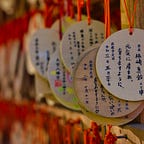Medium post #3
The Korean, “buraku”, and Okinawan people were victims of oppression by the Japanese government. It is impossible to go back in time to change history, but we can document them to prevent similar things from happening again. I think in order to ethically and properly record them would be collecting first-hand accounts. Considering that the government was the oppressor, documents from the government’s side are likely to be bais towards them. Therefore, it is crucial to preserve the stories of the people who been through the harsh experience. Not everything was written down on paper, and personal experience is one of the things that has to be directly heard from the individuals. Like the pandemic that we are currently going through now. It is easy to find data on death tolls, economic impact and etc. However, personal situations are not something the government keeps track of. For most people, these times are tough, like losing their jobs, their loved ones, trapped at home, but to some, the pandemic gave them an opportunity to change their life for the better. For example, the pandemic prevented me from meeting people and making new friends, but it allowed me to discover new hobbies and passions. I think these experiences of the people living through historical moments would be very interesting for future historians to read through. If a history-writing is going to be about a specific group of people, it is important to make sure that stories from their point-of-view are included.
